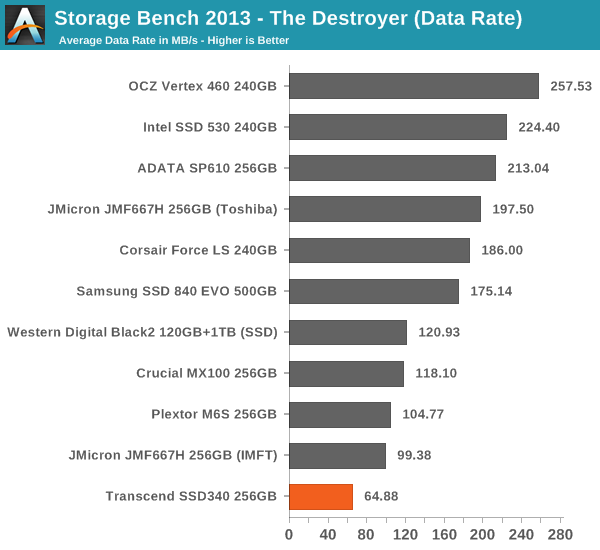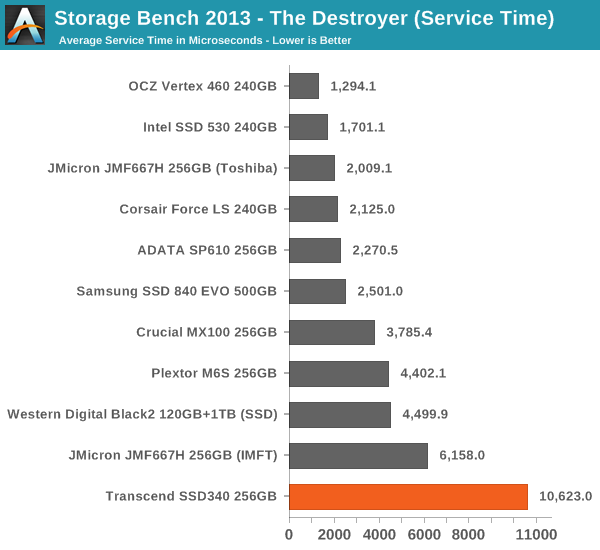Transcend SSD340 (256GB) Review
by Kristian Vättö on August 4, 2014 5:00 AM ESTAnandTech Storage Bench 2013
Our Storage Bench 2013 focuses on worst-case multitasking and IO consistency. Similar to our earlier Storage Benches, the test is still application trace based – we record all IO requests made to a test system and play them back on the drive we are testing and run statistical analysis on the drive's responses. There are 49.8 million IO operations in total with 1583.0GB of reads and 875.6GB of writes. I'm not including the full description of the test for better readability, so make sure to read our Storage Bench 2013 introduction for the full details.
| AnandTech Storage Bench 2013 - The Destroyer | ||
| Workload | Description | Applications Used |
| Photo Sync/Editing | Import images, edit, export | Adobe Photoshop CS6, Adobe Lightroom 4, Dropbox |
| Gaming | Download/install games, play games | Steam, Deus Ex, Skyrim, Starcraft 2, BioShock Infinite |
| Virtualization | Run/manage VM, use general apps inside VM | VirtualBox |
| General Productivity | Browse the web, manage local email, copy files, encrypt/decrypt files, backup system, download content, virus/malware scan | Chrome, IE10, Outlook, Windows 8, AxCrypt, uTorrent, AdAware |
| Video Playback | Copy and watch movies | Windows 8 |
| Application Development | Compile projects, check out code, download code samples | Visual Studio 2012 |
We are reporting two primary metrics with the Destroyer: average data rate in MB/s and average service time in microseconds. The former gives you an idea of the throughput of the drive during the time that it was running the test workload. This can be a very good indication of overall performance. What average data rate doesn't do a good job of is taking into account response time of very bursty (read: high queue depth) IO. By reporting average service time we heavily weigh latency for queued IOs. You'll note that this is a metric we have been reporting in our enterprise benchmarks for a while now. With the client tests maturing, the time was right for a little convergence.

Ouch, this is bad. The SSD340 is the slowest SSD in our 2013 Storage Bench and the difference is quite substantial. Given the results on the previous page along with the results here, it is clear that the SSD340 is not suitable for IO heavy workloads that require consistency. It still might have something to offer in lighter workloads, but that's looking increasingly doubtful.











57 Comments
View All Comments
ddriver - Monday, August 4, 2014 - link
I didn't say "value".Impulses - Monday, August 4, 2014 - link
Besides, $30 32GB SD cards actually hit 45-60MB/s sequential.. Think I saw a $65 64GB PNY rated at 90/60 R/W, doesn't get any more value priced than that, unless you meant bargain bin SD cards...hojnikb - Tuesday, August 5, 2014 - link
Yeah, but sd card like that would be pretty unsuitable for running OS.Impulses - Tuesday, August 5, 2014 - link
Obviously, their random access speed sucks, he and I were just drawing a parallel to other cheap devices with sequential speeds that aren't very far off... Shoot, I've paid <$50 for 32-64GB USB 3.0 flash drives that hit 200MB/s sequential read/writes. I think any enthusiast knows sequential speed isn't ultimately why you buy a SSD (most of the time), but still...willis936 - Monday, August 4, 2014 - link
I'm pretty sure SSDs from 2009 are faster than this.hojnikb - Monday, August 4, 2014 - link
they are not.ddriver - Monday, August 4, 2014 - link
2-3 years ago was 2011-2012 :) I have a Samsung 830 128 GB which IRC came out around that time, and it is actually faster, reaching like 380 MB/sec in sequential reads.ddriver - Monday, August 4, 2014 - link
*writesCome on AT, what is this - the stone age? You know, the time people wrote on stone tablets and editing was pretty much impossible? How about an "edit" feature?
jabber - Monday, August 4, 2014 - link
I have to say as long as they push 150MBps+ with 0.XX access times most cases are covered.All in the access times for day to day usage, not so much the raw MBps.
hojnikb - Monday, August 4, 2014 - link
its not all about access times.You can have a bad ssd with great access times and it will still feel slow as HDD if writes are utter garbage (you can test this by installing OS on a cheap usb drive).